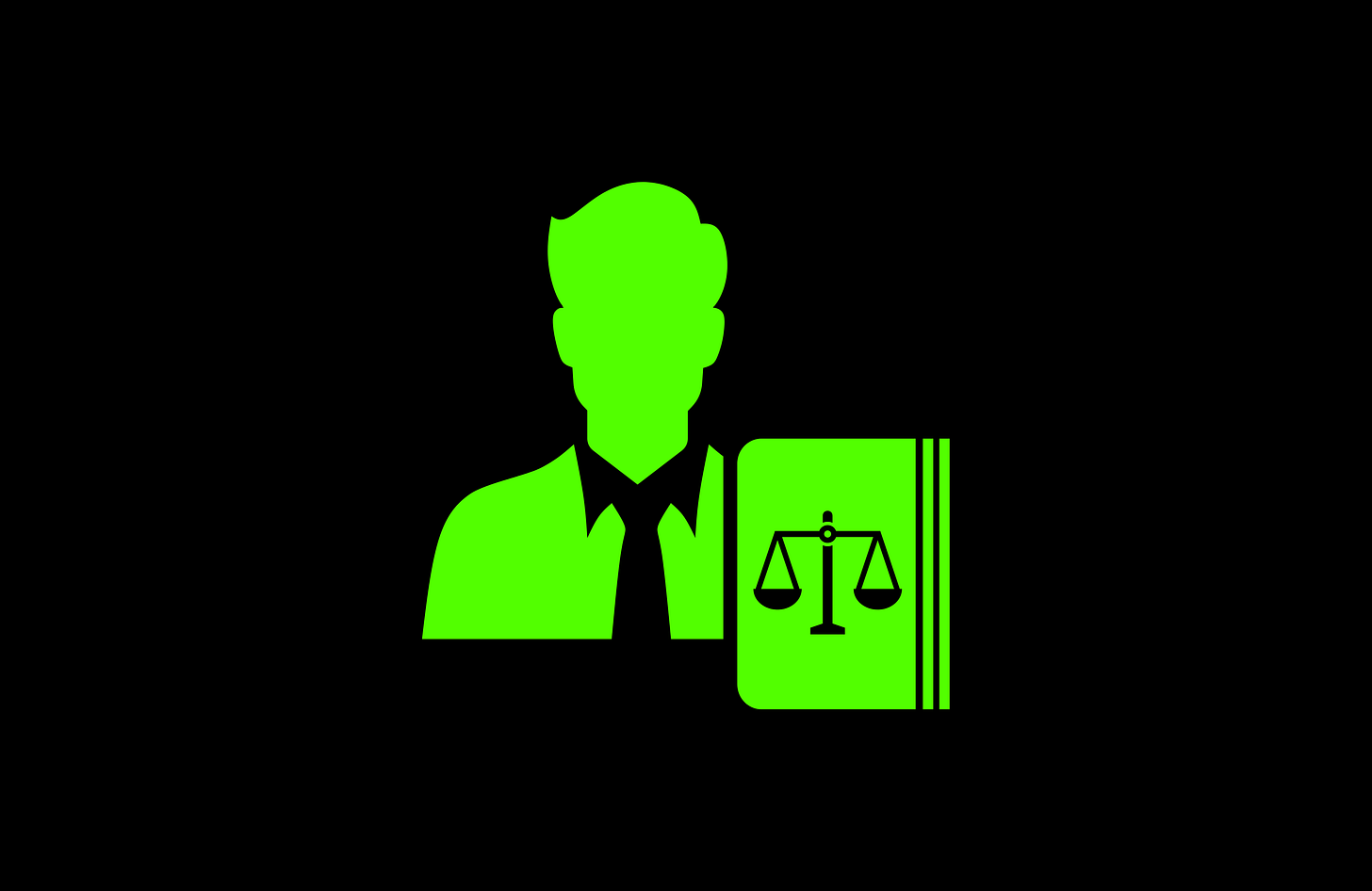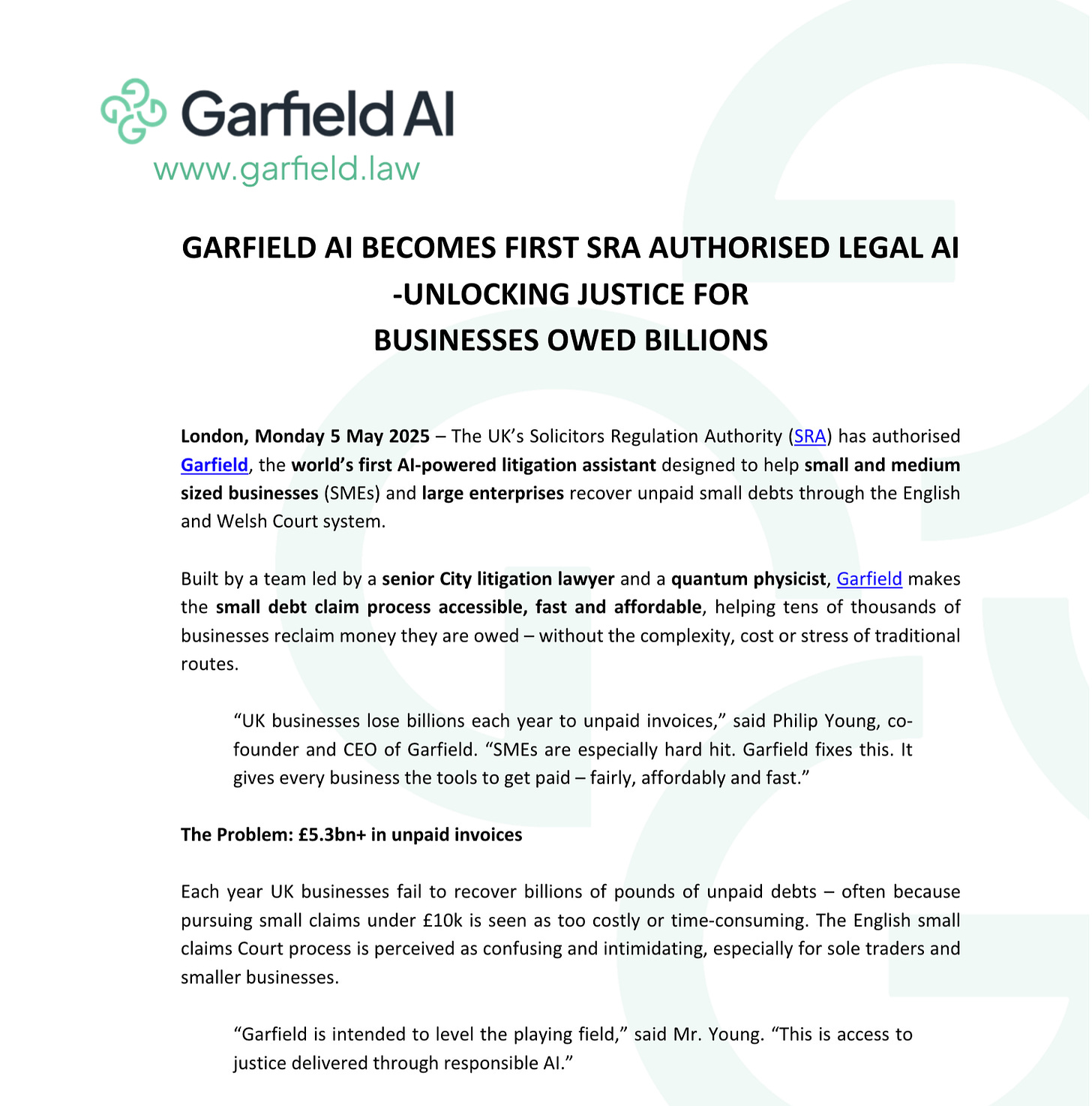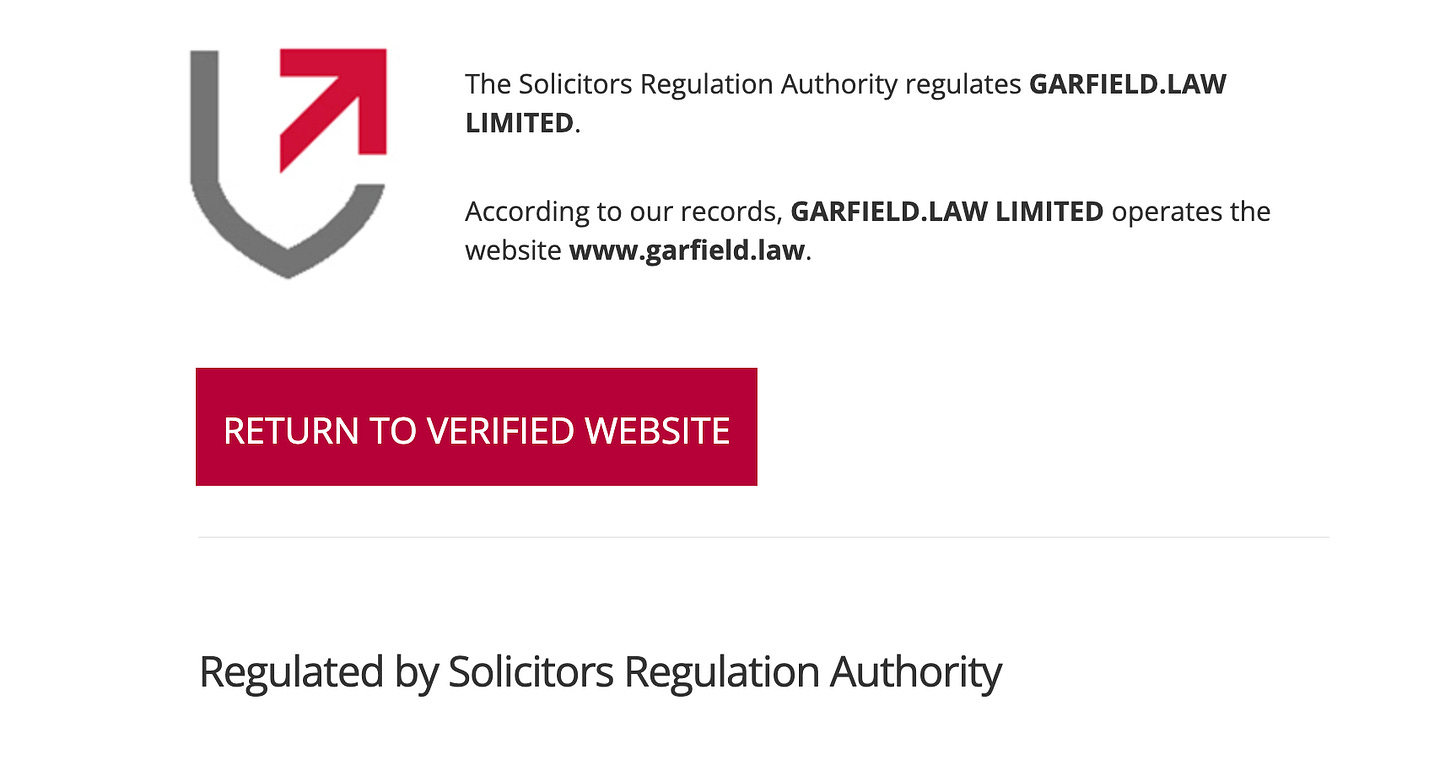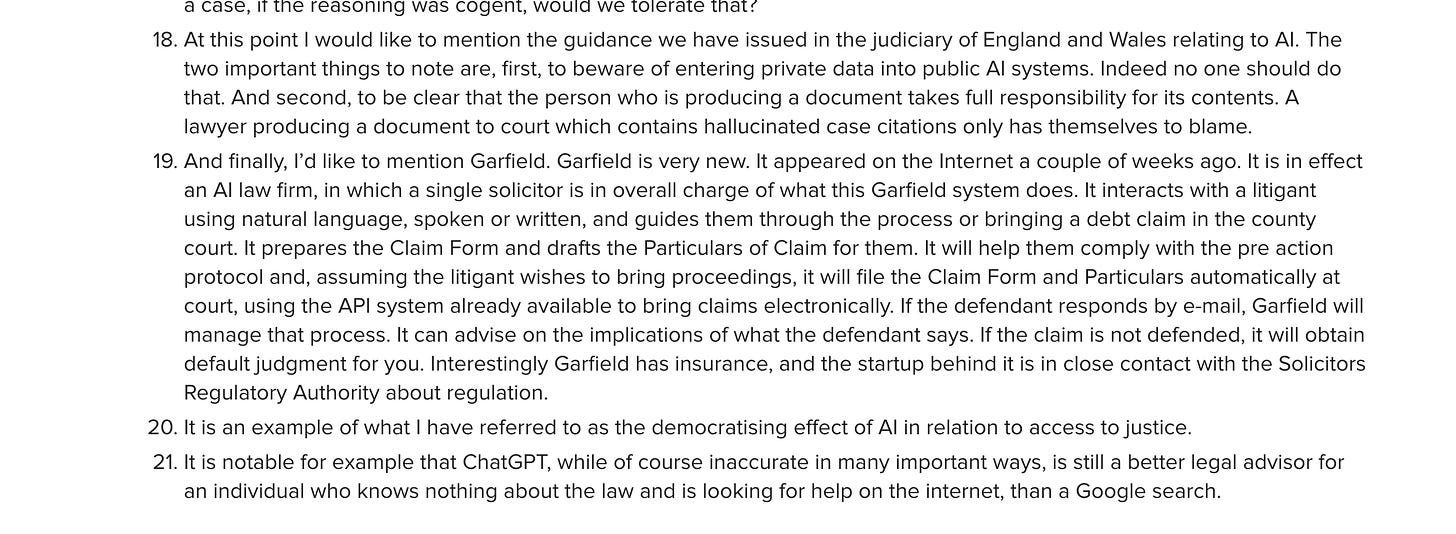The World’s First AI Law Firm: Garfield AI
Newsletter Issue 37: Garfield AI is the world’s first fully artificial intelligence law firm, offering legal services from just £2.
Garfield AI is officially the world’s first fully AI-powered legal practice, offering services like debt recovery letters for as little as £2. It has been approved by the regulator and is already open for business. Built by a seasoned litigator and a quantum physicist, this AI-powered law firm is aiming to disrupt the legal industry by making legal support faster, cheaper, and accessible to everyone.
A Legal Revolution Begins with Garfield AI
Garfield AI has officially become the first law firm powered entirely by artificial intelligence to receive authorisation from the Solicitors Regulation Authority (SRA) in the United Kingdom. This approval is a regulatory “green light” that allows Garfield AI to operate as a recognised law firm under the legal framework that governs traditional solicitors and legal businesses
The firm (Garfield AI) will not employ human lawyers to provide legal advice. Instead, it will use machine learning models and algorithms to generate legal documents and respond to clients' legal needs. This includes producing letters before action for issues like unpaid debts, assisting with simple contract disputes, and responding to data protection matters. These services are designed to be fast, affordable, and accessible to individuals and small businesses.
Many individuals and small enterprises either delay or avoid seeking legal help because of the cost and complexity involved. Garfield AI aims to reduce these barriers by offering document generation services starting at as little as £2.
The SRA’s decision to authorise Garfield AI followed a detailed application process. The regulator examined the firm’s proposed operating model, how it would manage risks, and how it would ensure client protection.
According to the SRA, Garfield AI’s authorisation does not mean it is endorsing artificial intelligence as a replacement for human lawyers. It means the regulator is confident that the firm has taken the necessary steps to comply with regulatory requirements, including transparency, consumer protection, and data security.
Garfield AI will operate as an Alternative Business Structure (ABS), which allows non-lawyers to have ownership or management roles in legal firms. The SRA has stated that it will continue to monitor the firm closely, especially in the early stages, to ensure compliance with all professional standards.
This development is likely to raise important discussions within the legal profession and beyond. The fact that the SRA has approved a law firm with no qualified human solicitors delivering legal advice marks a significant departure from traditional practice.
Garfield AI will now need to demonstrate that it can maintain high-quality service, accuracy, and consumer confidence using only artificial intelligence tools.
Legal Services Starting at Only £2
Garfield AI is entering the legal market with a clear pricing model that reflects one of its core objectives: affordability. The firm offers automated legal services starting at £2.
This is the baseline price for generating certain legal documents, including letters before action for debt recovery and responses to straightforward legal claims.
This pricing structure is intended to address a persistent issue in legal services. Many individuals and small business owners are unable to access professional legal support due to high costs. In particular, small businesses dealing with unpaid invoices or contract disputes often lack the budget to engage a solicitor.
As a result, they may choose to absorb financial losses rather than pursue legal remedies. Garfield AI is attempting to change this pattern by offering low-cost tools that allow users to take action through legally sound documents generated by artificial intelligence systems.
The service does not require users to schedule appointments, wait for call-backs, or negotiate fees. The process is designed to be completed online, quickly and independently. A client can enter relevant details, and the system will produce a document in minutes, often for less than the price of a coffee.
While this pricing model is a dramatic departure from traditional law firm billing, it is important to note that Garfield AI is not offering legal representation in court. The services are focused on early-stage dispute resolution and simple document preparation. These are areas where many people simply need help to put their position in writing clearly and correctly. Garfield AI provides this help at a price that most people can afford.
This affordability also has potential social implications. Access to legal services is often seen as a barrier to justice for people without financial resources. By lowering the entry cost for resolving a dispute or sending a formal demand, Garfield AI introduces an option that is not limited by income or location.
Its platform can be accessed by anyone with an internet connection and a need for basic legal support.
The firm's pricing strategy is a statement about how technology can be used to deliver specific legal outcomes at a cost that reflects the actual time and complexity involved. In that sense, Garfield AI is an attempt to redefine how much access to the legal system should cost.
Please consider become a paying subscriber to access exclusive analysis, early alerts on regulatory, law and policy changes, practical insights, and commentaries on tech law.
Meet the Founders
Garfield AI was not built by a team of anonymous developers or corporate executives. It was created by two individuals who bring very different yet complementary backgrounds to the project: Philip Young and Daniel Long.
Together, they designed and launched the world’s first AI-operated law firm with a clear vision and a practical understanding of what is needed in the legal services market.
Philip Young is not new to the legal world. He is a former lawyer with more than 30 years of experience. His legal career has involved high-value litigation and commercial disputes. He understands the structure of legal arguments, the process of litigation, and how legal services are delivered on the ground.
Philip has been a founder before. He co-founded a successful legal consultancy and litigation firm, demonstrating that he understands both the professional and business aspects of law. His decision to step away from traditional practice to build an AI law firm shows a willingness to question familiar systems and rethink how legal support is provided.
Daniel Long comes from a very different professional field. He is a physicist with expertise in quantum computing and artificial intelligence. He has no background in legal work, but he brings deep knowledge of systems design, data processing, and machine learning. Daniel has worked on projects involving complex modelling and automation, skills that are essential for developing a system capable of producing legally accurate documents with minimal human oversight.
Their collaboration began when both recognised a gap in the market. Philip saw people who needed help but could not afford a lawyer. Daniel saw a technical pathway that could automate legal logic at scale. Instead of creating a general legal tech platform or a tool for lawyers, they decided to build a regulated law firm where AI handles legal services directly.
Philip ensures that the AI system respects legal standards, professional ethics, and client protection rules. Daniel is responsible for ensuring that the technology performs as intended, including constant monitoring and refinement of the AI tools. Together, they supervise how the firm operates, although neither of them provides legal services in the traditional sense.
Consider subscribing to the Tech Law Standard. A paid subscription gets you:
✅ Exclusive updates and commentaries on tech law (AI regulation, data and privacy law, cybersecurity, digital assets governance, and internet law).
✅ Unrestricted access to our entire archive of articles with in-depth analysis of tech law developments across the globe.
✅ Read the latest legal reforms and upcoming regulations about tech law, and how they might impact you in ways you might not have imagined.
✅ Post comments on every publication and join the discussion.







Actually bound to happen if u think about it. If handled properly, can't see any negative.
It'll be a long and winding road for them that's for sure. But theyve really done well for themselves .